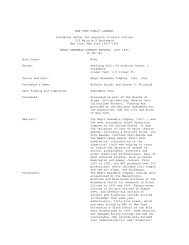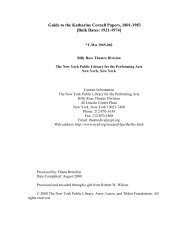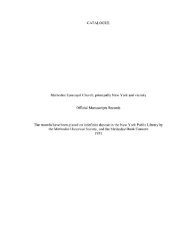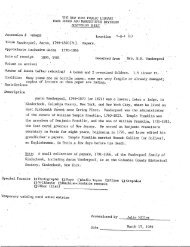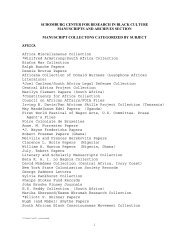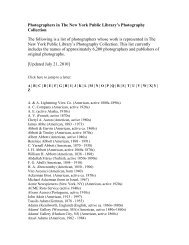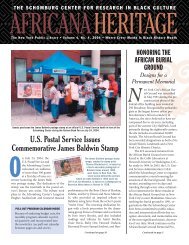View PDF finding aid (688.86 KB) - New York Public Library
View PDF finding aid (688.86 KB) - New York Public Library
View PDF finding aid (688.86 KB) - New York Public Library
Create successful ePaper yourself
Turn your PDF publications into a flip-book with our unique Google optimized e-Paper software.
Katharine Cornell Papers<br />
Unsatisfied with the many American actors they had auditioned for the role of Robert<br />
Browning, Cornell and McClintic turned to the London stage and brought Brian Aherne<br />
over for his <strong>New</strong> <strong>York</strong> debut. The Barretts of Wimpole Street (1931) was not only a<br />
tremendous triumph for Cornell as an actress, but also her debut as a producer, which<br />
gave her a new position as an actress-manager.<br />
After more Broadway successes, including S. N. Behrman’s Brief Moment (1931),<br />
Thornton Wilder’s translation of André Obey’s Lucrece (1932) and Sidney Howard’s<br />
Alien Corn (1933), Cornell devoted the entire 1933-1934 season to a cross-country tour.<br />
Once standard practice, the tradition of the great stars bringing their productions around<br />
the country had gone out of fashion, but Cornell considered it a duty she owed to the<br />
public. After Cornell’s triumphant 77 city tour, many other actors followed in her<br />
footsteps. Her repertory company consisted of three plays, two established successes,<br />
Candida and The Barretts of Wimpole Street and one new production, Cornell’s first<br />
Shakespeare play, Romeo and Juliet. After a rocky start, Cornell and McClintic were able<br />
to hone the production and her performance as Juliet into what would become one of her<br />
most acclaimed roles. When they brought it back to <strong>New</strong> <strong>York</strong> in 1934, Cornell was<br />
hailed by many critics as the best Juliet in a generation.<br />
Cornell continued to tackle varied and challenging roles to great acclaim throughout the<br />
30s and early 40s. Some of her most successful roles in this period were in three Shaw<br />
plays, Saint Joan (1936), another Candida (1937) and The Doctor’s Dilemma (1941) as<br />
well as other classic plays in translation, such as Hebbel’s Herod and Mariamne (1938)<br />
and Chekhov’s The Three Sisters (1942). In Maxwell Anderson’s The Wingless Victory<br />
(1936) she played a Malayan princess and she also appeared in several contemporary<br />
urban plays, including John Van Druten’s The Flowers of the Forest (1935), S. N.<br />
Behrman’s No Time for Comedy (1939) and Dodie Smith’s Lovers and Friends (1942).<br />
Cornell, always a dedicated patriot was anxious to contribute to the war effort. In 1944,<br />
she took a company of actors abroad for a tour of the military bases of Europe,<br />
performing The Barretts of Wimpole Street with Brian Aherne and many former cast<br />
members, finally landing back on Broadway with the play in 1945. In the late 40s Cornell<br />
took on leading roles in classics such as Antigone (1946) and her Tony-award winning<br />
turn in Antony and Cleopatra (1947). She also appeared in another Candida (1946),<br />
costarring with a young Marlon Brando. Now over 50, and with the styles of acting and<br />
writing changing, Cornell was <strong>finding</strong> it increasingly difficult to find plays that intrigued<br />
her. She appeared in period pieces, such as That Lady (1949), The Dark is Light Enough<br />
(1955) opposite Tyrone Power and The Firstborn (1958). She also appeared in light<br />
comedies, such as Maugham’s The Constant Wife (1951) and The Prescott Proposals<br />
(1953).<br />
Before retiring, she would have one more triumph. The young playwright, Jerome Kilty,<br />
had written a two-person play called Dear Liar, based on the witty and touching decadeslong<br />
epistolary love affair between George Bernard Shaw and his muse, the great actress,<br />
Mrs. Patrick Campbell, who had appeared in many of his plays, most notably, originating<br />
the role of Eliza Doolittle in the original production of Pygmalion. As one of the last<br />
4



